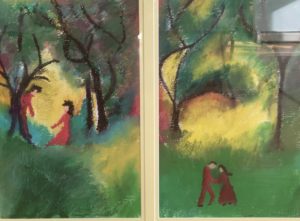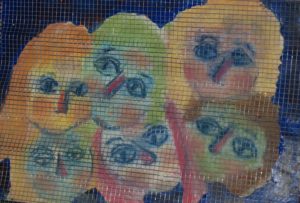Who is Attracted to Narcissists and Why
What conditions contribute to the attraction, intoxication, or codependency of one adult on another with a Narcissistic Personality Disorder?
-
What is the codependent/narcissistic dynamic?

The potentially codependent adult suffers from an inner belief that she or he is less important than others. These painful feelings that give this person an experience of themselves as inadequate and unloveable keep him or her stuck in confusion and self-doubt.
To relieve this constant anxious state of mind, they want to attach to someone who seems powerful, admirable, charming, and even brilliant in their estimation. Pairing themselves with such an idealized individual makes them feel more whole. It temporarily drives anxiety underground.
But this is an illusion, not reality.
What are characteristics of the co-dependent individual?
This person devalues themselves. However, they are empathic towards others and thus become an ideal mate (or target) for the narcissist who wants their adoration and constant attention. If someone devalues, underestimates, and distorts their own sense of self, they are vulnerable to attaching themselves to someone who they perceive is grander than them. Believing they have an actual connection with the grander person boosts their self- esteem.
However, this is all illusionary. The narcissist isn’t grand though he or she presents a grandiose appearance. The codependent person is not actually deficient as they imagine. However, both individuals perceive themselves this way and join together as if then they become one whole person psychologically.
Furthermore, this codependent person may have unreasonable guilt feelings about anything less than perfect in their behavior with others. As a result, they will at least partially suppress any justifiable anger towards others. This makes them the perfect target for the narcissist.
When the codependent person suppresses selective feelings especially those related to personal autonomy and aspirations of their own, they are predisposed to be “other-directed” responding to the overblown needs and ambitions of a narcissist. This person’s naturally healthy desires for accomplishment and independence conflict with deep feelings of insecurity along with wishes for connection and approval. They feel if they are coupled with a highly valued other then they are part of an accomplished pair.
Interpersonal Patterns of Behavior

If the insecure individuals satisfy the narcissist’s needs, rather than their own, they further deplete their sense of self. This predisposition to be other-directed may correspond to an upbringing where the individual inhibited one’s own needs to affirm and seek love and approval from self-absorbed, self-centered parents.
This early pattern continues into adulthood when the individuals limit themselves and seek satisfaction from attaching themselves to another with great ambition. This vulnerable person internalizes that the needs of others take priority over their own. This is the beginning of the emotional and developmental wounding that leads one down a path of lowering one’s own self-esteem further and further becoming more and more vulnerable to exploitation.
Followers of a Narcissist

When narcissists become public figures with actual political power, they are perceived by vulnerable constituents as larger than life. The narcissist’s charm and often pronounced speaking ability draws large audiences who reinforce each other’s misguided beliefs about the grandeur of this powerful person with whom they seek connection.
If this powerful person speaks to small groups or individuals, he or she will make these insecure followers feel special. This need to feel so special and be in the powerful person’s “circle” misleads the follower to believe only what reinforces their own need for such a connection. Doubts about the narcissist based on observation of aggressive behavior are quickly dismissed.
If you are part of a large audience or group who is believing the narcissist’s unsubstantiated claims for what he or she will do for you, then you believe the unbelievable. Followers reinforce each other by selectively dismissing the words or advice from non-followers.
The followers sense of being entitled to their own worthiness is distorted by intense inner conflict that makes them prone to avoid a deeper look at themselves. They become prone to attach themselves to those whom they regard as grand, super-engaging, and powerful enough to meet their needs.
This grand narcissistic leader is a remarkable actor who sways his audience over and over again, continually reinforcing their unproven and often absurd narcissistically unfounded beliefs.
Can Codependent Individuals and Followers Change?

This is the most difficult question to ask. Intense inner conflict must become so emotionally painful that the individual is compelled to question their distorted depleted outlook about themselves and their exaggerated views of others. If their inner pain or dissonance becomes overwhelming they may begin to recognize and reevaluate their distorted perceptions and discover a healthier sense of self.
For this to eventually occur an internal process of questioning needs to take place. If one stays isolated in a small or large group of narcissistic followers they will find it very difficult to question themselves.
The influence of others who are truly empathic to their needs and honest about their beliefs will need to become ever-present to turn the follower into a questioner.
Thus, whomever one surrounds oneself with (if vulnerable due to low self-esteem) while also feeling impoverished in significant ways is a key factor. Followers perpetuate myths generated by the narcissist reinforcing each other’s misguided beliefs.
Whether the follower is a child in a family with a powerful parent or a constituent in an organization or geographic locale with a narcissistic leader they must become exposed to more accurate and reliable information from actual trustworthy people.
It takes courage for anyone predisposed to join a narcissist (to boost their own self-esteem) to challenge their own distorted values as absurd. Individuals once guided by misinformation over an extended period of time reinforced by those in isolated families or groups or misinformed others in a single geographic area or within a group on the internet will continue to be persuaded not to think for themselves or question what they have believed.
No one wants to feel fooled or duped or exploited. So an unhealthy response is to deny that this is happening until conflict is so overwhelming that questioning takes place.
Reclaiming the Self
Recovering from codependent neurosis especially when it spreads to groupthink means giving up beliefs in unworthiness and inadequacy. This requires learning to set boundaries and saying no to those who do not support one’s well-being (including unknown strangers on the internet).
It is essential for the codependent person not to be judgmental of oneself, subtly sabotaging efforts at assertion, sound decision-making, and the right to hold others accountable for their actions in order to preserve one’s own dignity and respect.
This only comes with eventual acceptance that there are enough rights to be provided regularly for every individual. This requires that the narcissist’s contribution be accurately assessed as flawed.
Clues that a new accurate assessment is warranted and even desperately needed includes rampant feelings of anxiety, confusion, destabilization, and disorientation. When such feelings of profound uneasiness arise, it’s important for the individual to sense something is wrong with their reality testing rather than continue to behave as if everything is “normal” when it is not.
The Potential Consequences of Individuals or Groups Asserting their Rights
The longer the codependency/narcissistic dynamic has gone on in a couple or large group, the harder it will be for change to occur. Only when the codependent individual or group feels depleted significantly will one’s own initiative become central.
When and if this occurs the narcissistic leader or family member will most likely double down on his or her efforts to sustain their unwarranted position of power often epitomized by a refusal to communicate directly or actually answer questions without sidestepping significant issues.
The individuals or groups newly asserting their own beliefs based on evidence and good judgment must continuously be reasserted ignoring the dissident reactions of the narcissistic leader. Only then will the narcissist no longer have his or her power reinforced and reinstated. To be ignored and humiliated is the Achilles heel of the flawed narcissist who perpetually seeks affirmation of his or her misperceived grandiosity and misguided claims to power.
The Impact of Realistic Danger on the Companion or Follower of a Narcissist
When someone is codependent on a narcissist as a companion or leader of a group and they see actual real danger to others occurring, then the codependent person who has never had an intention to hurt others, begins to see reality.
Questioning one’s beliefs finally comes about.
Real dangers include poverty, malnourishment, unlawful behavior, fatal disease, death, and loss of love. Fears of loss of love can be as powerful as fears of one’s own or others’ deaths.
The narcissist promises a love they cannot actually understand nonetheless give because they lack the capacity for empathy—their major flaw.
When the persuaded follower realizes there is no falsely promised love coming to them from the narcissist it is such a dramatic wake-up call that a person’s profound need for self-preservation clicks in and they think for themselves.
To repeat: when the follower or companion of a narcissist is awakened to the fact that the narcissist they are supporting is putting others in danger, the words, “STOP and THINK FOR YOURSELF” come to mind.
If the narcissistic characteristics go beyond lack of empathy to lack of guilt, remorse, and shame then the vulnerable person has tied themselves to a likely sociopath or psychopath who can inflict harm on others.
The unsuspecting vulnerable person never intended to be a companion or group follower to someone who seriously harms others, so they finally see danger signs in bright lights and re-find and reclaim their own moral compass and good judgement.
Then this vulnerable person is relieved of the narcissist’s hold and feels a new freedom to seek others who can be trusted in reality. A positive sense of self is found or recovered and able to grow.